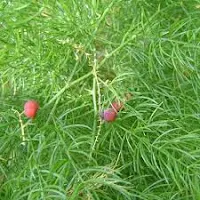http://www.sidhhaherbs.blogspot.com சதாவரி
Asparagus Rasemosus- Shathaveri
Shatavari is also known as Asparagus racemosus. It’s a member of the asparagus family. It’s also an adaptogenic herb. Adaptogenic herbs help your body cope with physical and emotional stress.
Shatavari is considered a general health tonic to improve vitality, making it a staple in Siddha and ayurvedic medicine
.It has antioxidant properties
Antioxidants help prevent free-radical cell damage. They also battle oxidative stress, which causes disease. Shatavari is high in saponins. Saponins are compounds with antioxidant abilities.
According to a
It has anti-inflammatory properties
Racemofuran, which is found in Shatavari, also has significant anti-inflammatory capabilities. According to the book Medicinal Cookery: How You Can Benefit from Nature’s Pharmacy, racemofuran acts similarly in the body as prescription anti-inflammatory drugs known as COX-2 inhibitors. These types of drugs are thought to reduce inflammation without serious digestive.
It may help boost your immune system
Shatavari is used in Siddha and Ayurveda as an immunity booster. According to a 2004 study, animals treated with shatavari root extract had increased antibodies to a strain of whooping cough when compared to untreated animals. The treated animals recovered faster and had improved health overall. This suggested an improved immune response.
According to a 2000 study on mice, Shatavari root juice is a natural cough remedy in West Bengal, India. Researchers evaluated its cough-relieving abilities in coughing mice. They found that Shatavari root extract stopped the cough as well as the prescription cough medicine codeine phosphate. More studies are needed to determine how shatavari works to relieve coughs.
Shatavari is used as a folk remedy for diarrhea. Diarrhea may cause serious problems, such as dehydration and electrolyte imbalance.
According to a
Diuretics help your body get rid of excess fluid. They’re often prescribed for people who have congestive heart failure to remove excess fluid from around the heart. Prescription diuretics may cause serious side effects.
According to a 2010 study on rats, Shatavari is used as a diuretic in Siddha and ayurveda. The study found that 3,200 milligrams of Shatavari had diuretic activity without causing acute side effects. More study is needed on humans before shatavari can be safely recommended as a diuretic.
Ulcers are sores in your stomach, small intestine, or esophagus. They may be very painful. They can cause serious complications, such as bleeding or perforation.
According to a
Kidney stones are hard deposits that form in your kidneys. As they pass through your urinary tract, they may cause excruciating pain.
Most kidney stones are made of oxalates. Oxalates are compounds found in some foods, such as spinach, beets, and french fries.
In a
Type 2 diabetes is on the rise, as is the need for safer, more effective treatments. According to a 2007 study, shatavari may help maintain blood sugar levels. It’s thought compounds within the herb stimulate insulin production, although it’s unclear exactly how.
More study is needed, but researchers suggest understanding how Shatavari impacts blood sugar may hold the key to the development of new diabetes treatments.
Shatavari may be one of nature’s best-kept anti-aging secrets. According to a 2015 study, the saponins in shatavari root helped reduce the free-radical skin damage that leads to wrinkles. Shatavari also helped prevent collagen breakdown. Collagen helps maintain your skin’s elasticity.
More study is needed before topical shatavari products hit the market. However some researchers believe they may be the future of safe, anti-aging skin care.
According to the Anxiety and Depression Association of America, major depressive disorder affects over 16.1 million American adults yearly. Yet many people can’t take prescription depression medications due to negative side effects.
Shatavari is used in Ayurveda to treat depression. A 2009 study on rodents found the antioxidants in Shatavari have strong antidepressant abilities. They also impact neurotransmitters in the brain. Neurotransmitters communicate information throughout our brain. Some are associated with depression.
Shatavari isn’t well studied in humans. No standardized dose has been established.
According to an article published in the Journal of the American Herbalists Guild, these doses may prevent kidney stones: 4-5 milliliters of Shatavari root tincture, three times daily tea made from 1 teaspoon powdered shatavari root and 8 ounces water, twice daily. Many leyhiams are prepared and used for ladies' problems. It strengthens the womb.
http://www.sidhhaherbs.blogspot.com (127)

No comments:
Post a Comment